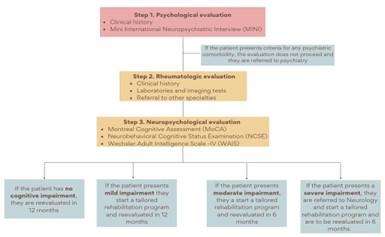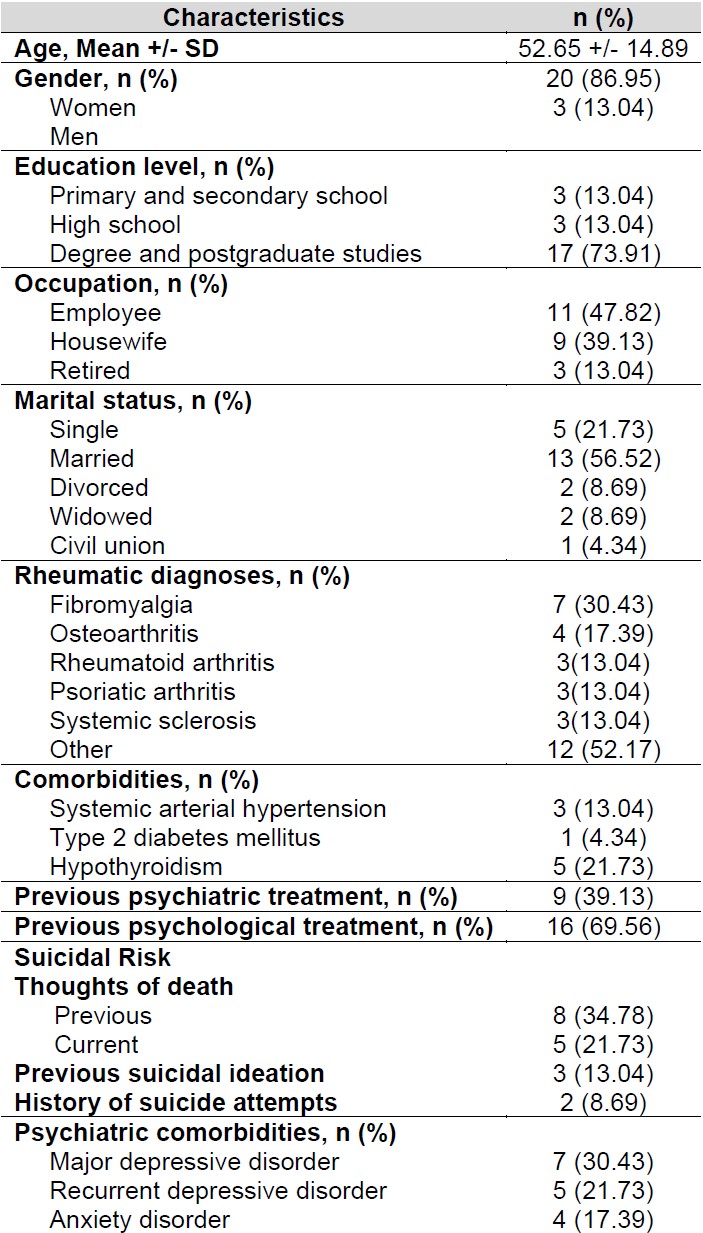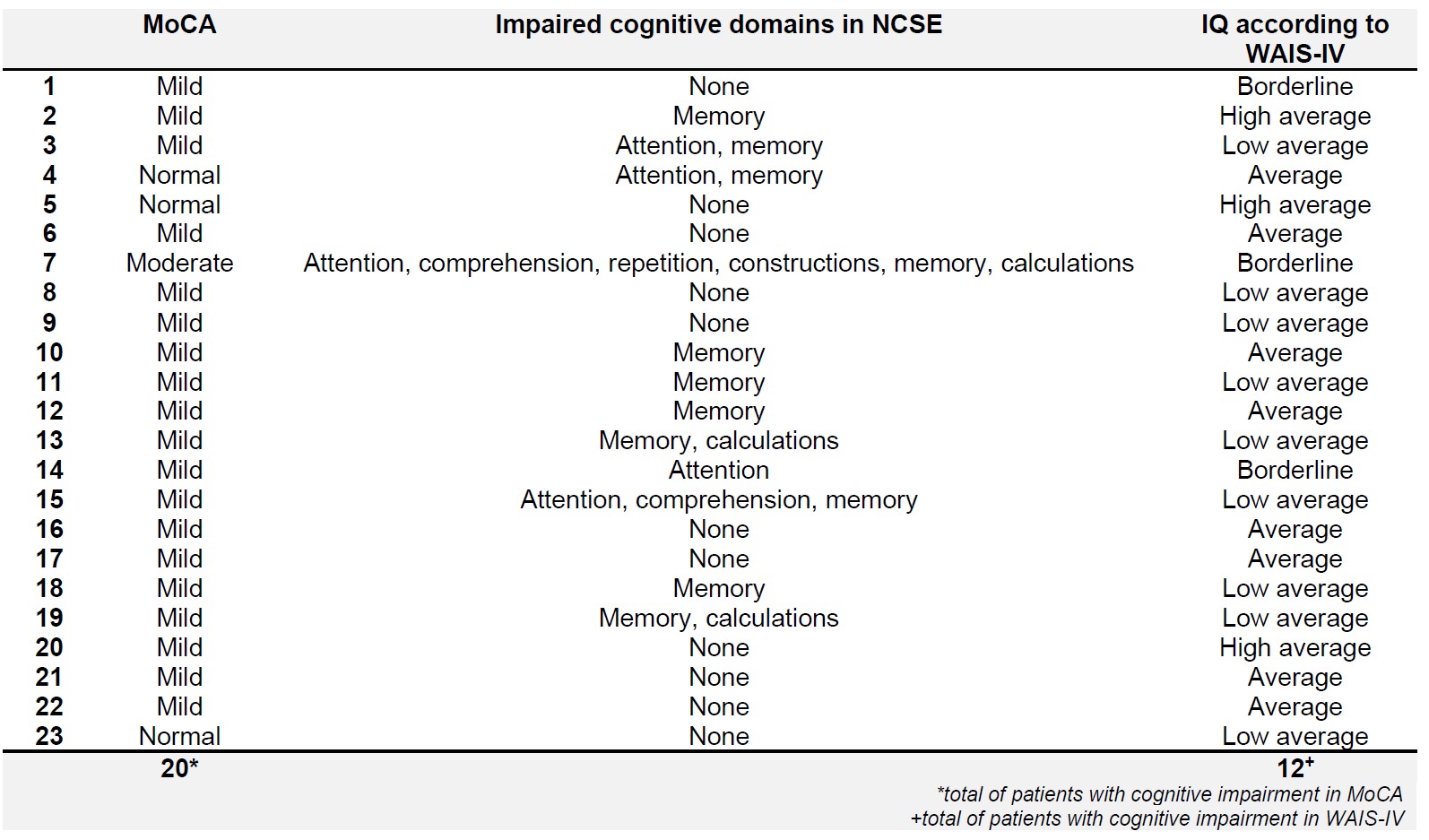Session Information
Session Type: Poster Session B
Session Time: 10:30AM-12:30PM
Background/Purpose: Patients with rheumatic diseases (RD) need their cognitive function intact to perform their daily routine or planning activities. Cognitive function includes orientation, attention/concentration, judgment/problem-solving, memory, and executive functions among others.
Cognitive dysfunction has been reported in patients with RD as part of the symptoms of their illnesses but it is also a symptom of a wide range of psychiatric disorders such as major depressive disorder or anxiety disorder. Patients with RD can have a self-perceived cognitive impairment that may or may not be related to their illness. We aim to determine the prevalence of cognitive impairment and most impaired cognitive domains with three different psychological tests in patients with RD.
Methods: We performed an observational, descriptive, cross-sectional study. We evaluated patients from the rheumatology department of a university hospital from September 2022 to April 2024. Patients over 18 years old with at least one rheumatic diagnosis and a subjective perception of cognitive impairment affecting their daily lives were assessed. The assessment protocol of the Neurocognitive Evaluation and Rehabilitation Clinic is shown in Figure 1. We applied the Mini International Neuropsychiatric Interview (MINI) in the psychological evaluation. For the neuropsychological evaluation, we used the Montreal Cognitive Assessment (MoCA), Neurobehavioral Cognitive Status Examination (NCSE), and the Wechsler Adult Intelligence Scale-IV (WAIS-IV). The entire evaluation has a total duration of 6 hours.
Results: A total of 23 patients were evaluated, 86.95% were women with a mean age of 52.65 ±14.89 years. The most frequent diagnoses were fibromyalgia and osteoarthritis in 30.43% and 17.39%, respectively. Psychiatric comorbidities were found in 60.86% of the patients (Table 1). According to the Montreal Cognitive Assessment (MoCA) test, some level of cognitive dysfunction was found in 86.95% of patients. Working memory and attention were the most affected domains in the Neurobehavioral Cognitive Status Examination (NCSE), with 47.82 and 21.73%, respectively. The Wechsler Adult Intelligence Scale-IV (WAIS-IV) showed that 52.17% (12) of the patients had a below-average intelligence quotient (IQ). The indexes with below-average scores were perceptual reasoning and working memory, at 65.2 and 56.5%, respectively. (Table 2)
Conclusion: According to the MoCA, 86.9% of the patients evaluated had some level of cognitive impairment; this percentage decreased to 52% when assessed with WAIS-IV because the latter is more detailed in evaluating cognitive functions. Working memory was the most impaired cognitive domain in almost 50% of the patients using NCSE and 56.5% with WAIS-IV. Psychiatric disorders were present in more than half of our patients (60.86%); it is important to perform a complete psychological evaluation to correctly treat the cognitive complaints that RD patients have.
To cite this abstract in AMA style:
Madrid-Lopez G, Corral-Trujillo M, Hernandez Galarza I, Cardenas-de la Garza J, Galarza-Delgado D. Neuropsychological Evaluation of Cognitive Impairment in Patients with Rheumatic Diseases [abstract]. Arthritis Rheumatol. 2024; 76 (suppl 9). https://acrabstracts.org/abstract/neuropsychological-evaluation-of-cognitive-impairment-in-patients-with-rheumatic-diseases/. Accessed .« Back to ACR Convergence 2024
ACR Meeting Abstracts - https://acrabstracts.org/abstract/neuropsychological-evaluation-of-cognitive-impairment-in-patients-with-rheumatic-diseases/



